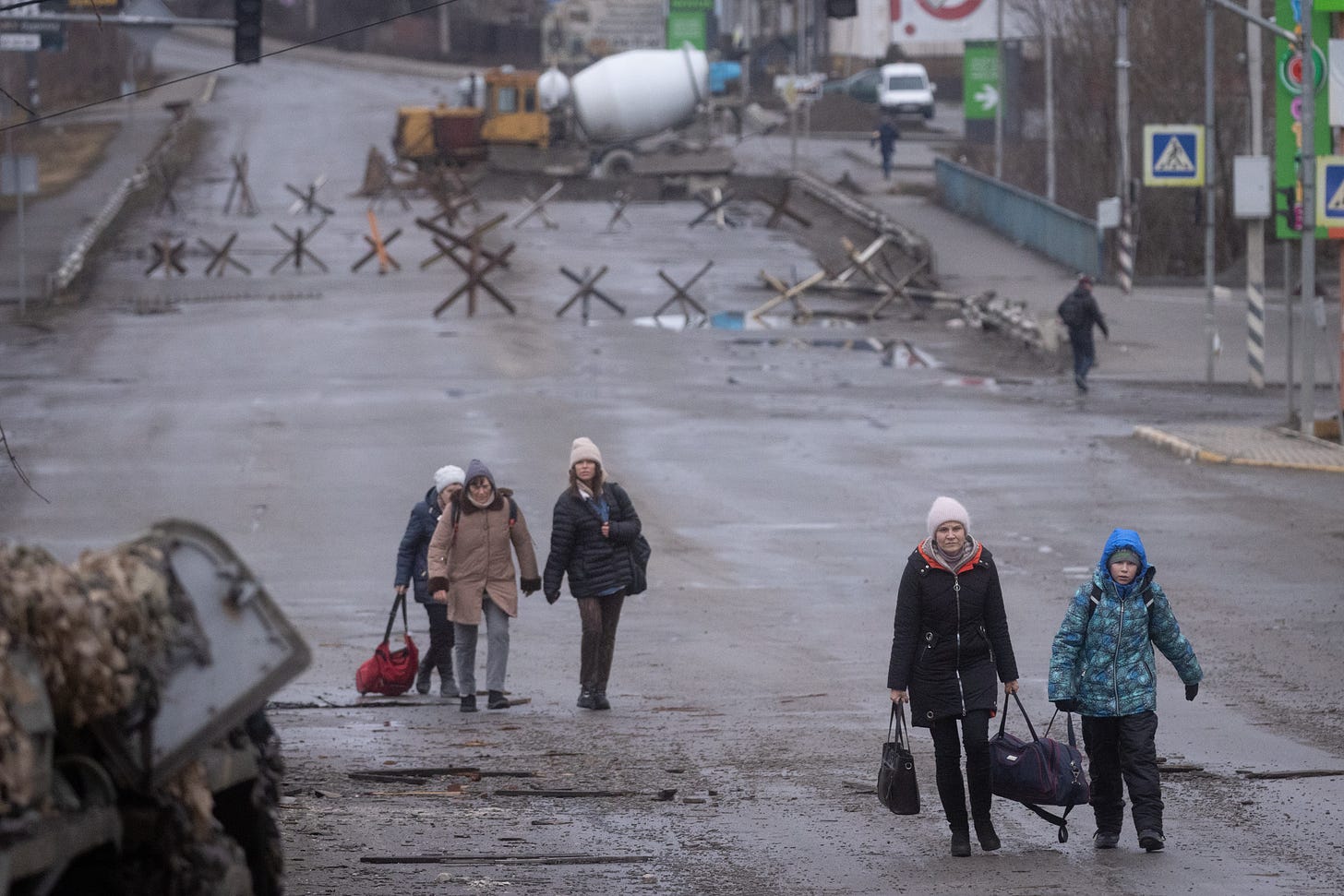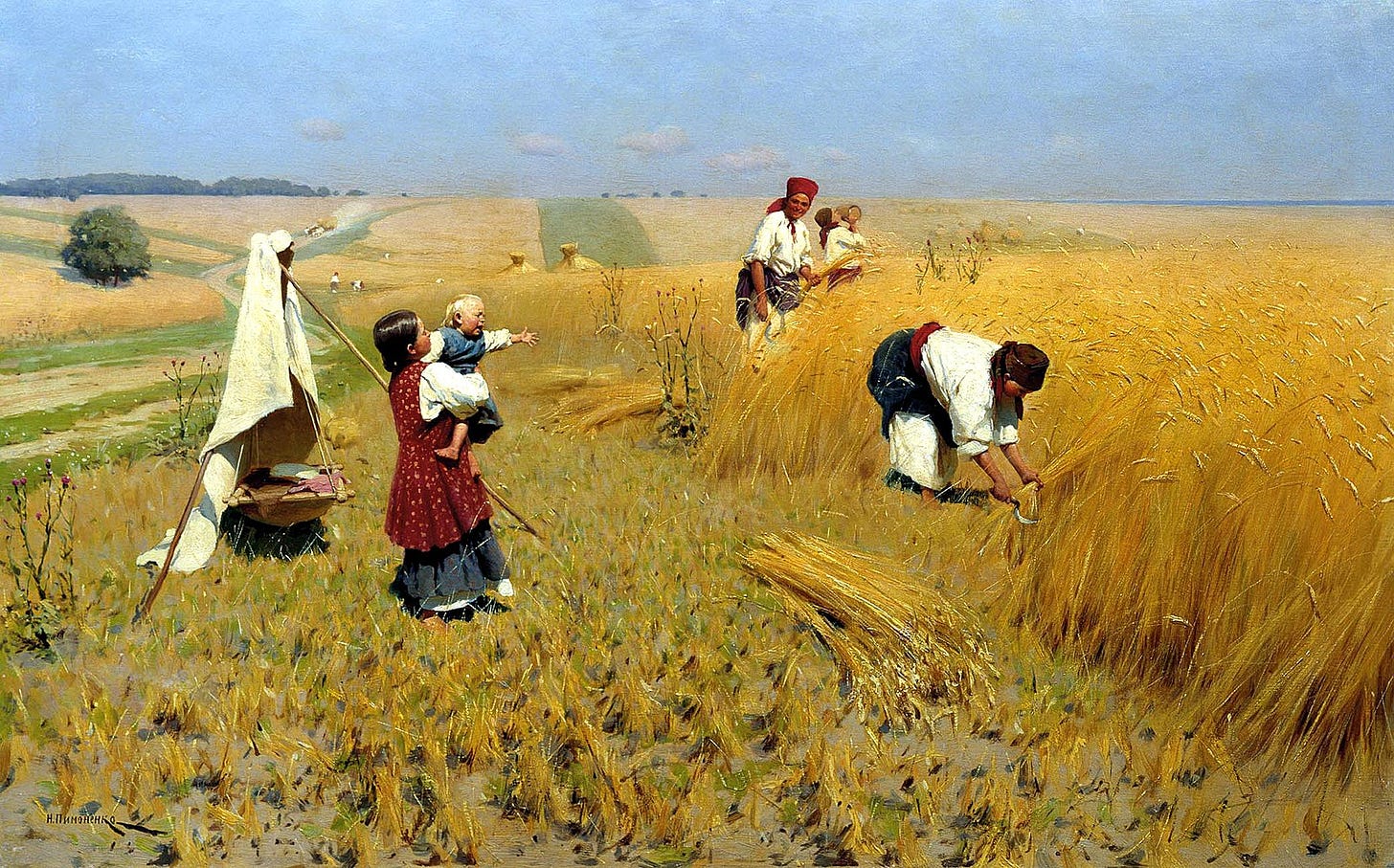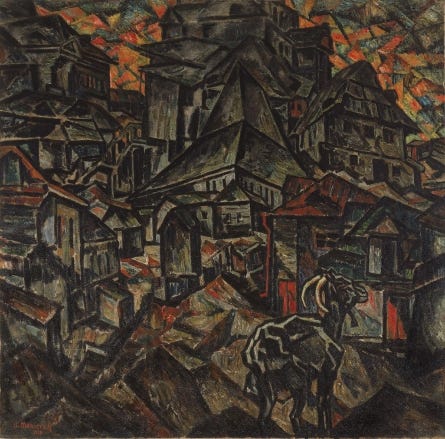Life in Stolen Skillets: Wartime Poetry from Ukraine
Four selections from Iya Kiva, in translation
Edited by David Swanson
For today’s newsletter, I initially set out to write about the Irish breakfast roll for our regular Friday series on Notable Sandwiches. In fact, I had gone so far as to research the origins of black pudding—attested to as far back as the works of Homer, and with a robust history of its own. Then I saw video of a nuclear power plant in Zaporizhzhia on fire, and the missile strikes leveling Chernihiv, and I lost my appetite. I don’t mean to deprive you of a lush description of an important foodstuff—a full Irish breakfast on a buttered baguette is no small thing, it is a lovely thing, and bread, when people are fleeing and starving, gets more important, not less. But I have friends in Ukraine—one who fled Kyiv, one who decided to stay; and friends with family trapped in Kyiv and its surroundings. From this far away I cannot help them concretely—I share and donate to fundraisers, such as the one for Meduza, one of Russia’s last independent media outlets, or donate to LGTBQ organizations in Ukraine who are facing the prospect of invasion by a murderously homophobic regime. And I’ve signed up to hopefully become a volunteer translator to help refugees with translate asylum petitions—Respond Crisis Translations helps people in countless languages, Ukrainian and Russian now urgently needed.
But for today, a different kind of crisis translation. One of the people I admire most in the world is the poet Ilya Kaminsky, who lived in Odessa until the age of sixteen, has spent this war writing eloquently about the uses of language, sharing news from his besieged friends and relatives at home, and most of all, and continually, sharing poems, translated from Russian and Ukrainian. Both languages are marvelous to write poems in—the cases and fluidity of the sentence structures allowing for magnificent plays on words and internal rhymes—and very difficult to carry over into the plainer bounds of English. Still, even muted by translation, poetry has a way of distilling events down to their jagged spines, all urgency and carefully chosen silences. Ukraine has a long history of violence, but it also has a history of great literature—from Gogol and Shevchenko to Babel to Stus—and the poet Iya Kiva is part of that tradition. Her poems are fractal, even chaotic, reflecting a lived experience of war. Born in Donetsk in 1984, she fled to Kyiv after the outbreak of violence in that region in 2014, and is now facing war again—while actively trying to organize visiting fellowships for scholars fleeing Ukraine. In lieu of the usual sandwich column, I have translated a number of poems from her collection “Podal’she ot Raya”—“Further from Heaven”—published by Kayala Press in 2018. (You can find further translations of Kiva’s work here and here.)
The first three poems here are translated from Russian, the last one from Ukrainian; Kiva writes each. The fact that most Ukrainians speak both Russian and Ukrainian, or a mix of both, which is its own dialect called “surzhik” after the admixture of wheat and chaff at harvest, puts paid to the lie Putin has been spreading about an incipient genocide of Russian speakers in Ukraine; not only are the two languages not enemies, they coexist in the same poet, in the same poem, on the same page.
now life is all in stolen skillets
in worn clothes in tattered pelts
in yellow peeling plaster
didn’t we sow didn’t we plow
didn’t we murder the murderers
and look what they’ve done all around us
it’s only filth
we fall and it doesn’t hurt
maybe we howl just a little
and forget where we’ve lived
and if we meet, Vanechka, in the next world
you’ll be wearing your red shirt
you’ll be raising your banner with the cross
I wrote a post at eight o clock
who will read it so early in the morning
deleted it
I wrote a post at eleven thirty
fifty three likes
three comments
no shares
I wrote a post at two in the afternoon
in order to attract attention
added a photo
seventy three likes
six shares
god save kittens
and people with cameras
I wrote a post at four eighteen pm
five miserable likes
apparently everyone’s been fed up since morning
I wrote a post at seven thirty
three hundred and two likes
I made a good joke
I wrote a post at ten fifty pm
added a video of a Bach symphony
let them all know I’m smart
five minutes to midnight I cursed Putin
what began then
I’ll count later
The Sword and the Sandwich is a newsletter about serious extremism and equally serious sandwiches. Please consider supporting this work with a paid subscription:
they beat you with especial cynicism and didn’t kill you
they raped you and didn’t come in you
they taught you to live a long time
work a lot
endure even more
what happened here?
everything happened here
enter it into the record
call the eyewitnesses
there are witnesses
where did they all disappear to
didn’t they arrive
didn’t they exist at all
didn’t they get called here
didn’t they trample the whole body
draw the sinews through the eye of a needle
didn’t they trample it down tight
hush you hush baby calm down
no one else is coming
don’t ask anymore
no one will gossip about you again
stare you in the face and grin
they buried you five years ago
and you remember nothing
they pulled the rope
and you fell
[note: this poem was translated from Ukrainian]
you stand in the middle of a city completely foreign to you
in the middle of its most famous cemetery
you read the inscriptions in Polish
you hear the noise of Polish tourists
tomb tomb tomb
they’re looking for someone’s death in Polish
you’re looking for someone’s death in Ukrainian
your relatives could be buried here
if they hadn’t been forced to become echoes
wandering Donbas seeking the death of Russians
so that at the same time on the other side of Ukraine
a girl with long black hair
moved her lips translating the language of death
searching the cemetery for her motherland
Translations by Talia Lavin









fantastic and so moving.